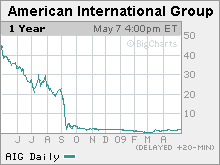AIG loss narrows by 44%
Troubled insurer posts first-quarter loss of $4.4 billion - 6th quarterly loss. Writedowns narrow as AIG makes strides in unwinding financial products unit.

NEW YORK (CNNMoney.com) -- Embattled insurer AIG reported its sixth-consecutive quarterly loss on Thursday, but the $4.4 billion loss narrowed sharply from the previous quarter's record-setting loss.
The company made progress winding down its financial products division, but insurance units continued to struggle despite slimmer writedowns.
The latest quarter included a $1.9 billion restructuring charge related to the ongoing unwinding of the financial products unit - the heart of the company's troubles.
The total quarterly loss was 44% narrower than the $7.8 billion loss from a year earlier. It was also much improved over last quarter's $61.7 billion loss. Once the world's largest insurance company, AIG has lost a total of $109 billion in the past six quarters dating back to October 2007.
Shares of AIG (AIG, Fortune 500) were unchanged in after-hours trading Thursday.
Encouraging signs. Analysts were heartened by the report.
"AIG has been successful in winding down a significant portion of its derivatives business, so losses should be declining," said Julie Grandstaff, managing director of StanCorp Investment Advisers. "And credit markets are improving, so the derivatives that AIG insures should be gaining value as well."
Thursday's announcement also marks the first time since AIG's original Sept. 16 rescue that the company has not explicitly said in its quarterly release that it would need additional bailout funds. The company has borrowed roughly $130 billion of $182 billion in loans that the government has made available.
Although writedowns continued, the figure has narrowed sharply. The company wrote down a total of $2.5 billion during the latest quarter, much smaller than the $25.9 billion the company wrote down in the previous quarter.
Only $294 million of the writedowns related to AIG's credit default swaps, which had plagued the company in previous quarters. Credit default swaps are essentially insurance contracts on complex derivatives that lost value as the housing market collapsed.
Since the start of 2008, the company has managed to reduce its portfolio of complex derivatives by 40% to $1.5 trillion, which largely contributed to the narrower writedowns.
In the year-earlier quarter, the company took a $5.9 billion writedown on those same assets.
Struggling units. The company's insurance units continued to struggle, barely squeezing out a profit as the number of premiums written tumbled.
Earnings at its general insurance unit fell 72% to $446 million, and its life insurance and retirement services unit posted a $1.2 billion profit, down 51% from a year ago.
Net premiums written in both units were down significantly. General insurance premiums written fell 17.5%, and they sank 10.5% in AIG's life insurance and retirement services divisions.
On a conference call with analysts, AIG executives blamed negative publicity "attacks" for the poor showing in its insurance units. In an effort to combat the negative sentiment, the company said it will sell its domestic life insurance under the brand "American General Life Co."
Asset sales: In an effort to repay the government, AIG has been shedding businesses. The company unloaded more than $1.2 billion of its subsidiaries during the quarter, and said it has several other sales in the works.
Still, many of the sales have been small relative to the size of the bailout, and AIG has admitted it has a long way to go.
"Several other transactions are under discussion, and we continue to evaluate how best to assure the continued strength and success of all of AIG's businesses," said AIG Chief Executive Edward Liddy on the conference call.
On March 2, AIG transferred its property and casualty businesses into a new, separate company called AIU Holdings. AIG did the same with its AIA Asian life insurance business and ALICO foreign life insurance unit.
The government will eventually take a stake in AIA and ALICO, and on April 22, AIG began the process of selling off a minority stake in AIU to investors.
Liddy said Thursday that the government will take its stake in the two units by the end of the third quarter, and progress on those transactions has been good so far. Furthermore, AIG said it would be open to selling off 20% of AIU in an initial public offering, depending on market conditions. ![]()

